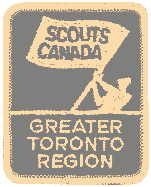
www.gtrsi.com
 |
www.gtrsi.com |
 |
| Subject | Grade | Comment |
| Outdoors | B+ | Had one outdoor meeting per month, needs to work on camping. |
| Cub Involvement | C- | Sixer's Council and Cubs rarely asked what they wanted to do. Assigned to groups for star/badge work. |
| Parent Involvement | D | Rarely communicated with parents. |
| Games | A- | Good variety and appropriately placed. Needs more cooperative games. |
| Going-up | A+ | 100% of eligible Cubs went up to Scouts |
| Retention | B+ | 80% of last year's Cubs returned. |
| Program ELements | C+ | Of 7 program elements, consistently ignored Playacting and Spiritual Fellowship. |
| Planning | B- | Very good in short and medium-range planning, but weak in creating long-range plan. |
If you were like I was, you dreaded the day when report cards were handed out at schoo. Well, rest easy; Scouts Canada is not planning to issue section report cards. However, in a way, leaders are on the receiving end of various informal report cards all the time.
For example, when you had pack registration this fall, what percentage of the Cubs who were eligible to return actually did rejoin your pack? That answer (your retention rate) serves, in part, as your final grade for last year's program. Unfortunately, those children who gave Cubs a "failing" grade by not returning are probably permanently lost to Scouting's programs.
What can we do to create and maintain a high retention rate?
The answer's easy -- offer a good program. But how do we know if we're offering one?
Chapter 3 ("Program Planning and Delivery") of The Wolf Cub Leader's Handbook is a good starting point. Following the handbook's four programming steps should help to point us in the right direction in terms of creating the program. But we still need to assess what we're doing.
Use a mixture of informal and formal evaluating approaches which examine both individual parts of your program, as well as the whole. Informal evaluations are somewhat unplanned. They call for you to be sensitive to what is happening, and/or being said, around you.
If you're leading a game, informal evaluation can occur as you watch the game unfold. Do the Cubs appear to be enjoying the game? Are they all actively participating, or are a number of Cubs starting to play another game within the planned game? Sometimes informal evaluation occurs at some point much later in time, long after an event is concluded. If Cubs walk into a meeting and spontaneously ask when they can play game X again (a game they played several weeks or even months ago), they're really giving you evaluative feedback. Listen for it.
The regularity of Cubs' attendance can also be a type of informal evaluation, but one which you can make more formal. There are many legitimate reasons why Cubs may have to miss occasional meetings, but persistent absenteeism certainly indicates dissatisfaction with the program you're delivering. Call or meet with the Cubs or their parents to find out why they're missing so many meetings. Otherwise, yo're left with just a best guess.
Formal evaluation: that's when the leadership team carefully thinks through both what it wants to evaluate and also how it will assess the results. Check out the meeting templates accompanying JUMPSTART packages; they provide time for a post-meeting get together of the leadership team. Use this time for a formal assessment of the strong and weak points of your meeting. Ask yourself what you can do to improve performance next time. The Sixers' Council could also provide invaluable feedback.
If you feel inadequate conducting formal assessments, you could ask a Service Scouter or an experienced leader from another pack to join a planning or section meeting. This person can observe, then provide your leadership team with evaluative feedback. Probably this person's thoughts will be more meaningful and productive if you agree beforehand on a few specific areas about which you particularly want some evaluative comments. However, consider giving that individual permission to add one or two other areas if he or she wishes.
Because it's the parents and guardians who normally have to 'fork over' the annual membership fees and weekly dues, don't ignore them in your program evaluation. When parents come to pick up their children following meetings (or other activities), take the chance to chat with them informally about their sons' and daughters' satisfaction with Cubbing.
At some mid-way point during the year (and certainly at the year's end), the leadership team should formally contact parents. Ask them for a candid assessment of their children's response to Cubs. Your interest will show parents that you really care about the program and their children.
"Do Your Best" is more than a motto for youth members. It's our goal as leaders, too. Evaluation, instead of being perceived as a report card-like threat, can become a valuable tool helping us to improve so Cubbing becomes the very positive experience for chidlren that we want it to be.
Dave Jenkinson is an active Scouter with 163rd Winnipeg Pack, and a former Manitoba provincial commissioner.
"Reproduced with permission of the Leader magazine
and the author."
|
Disclaimer: Anything posted to this Home Page
are the opinions of the individuals who posted them and are not the views of Scouts Canada. |